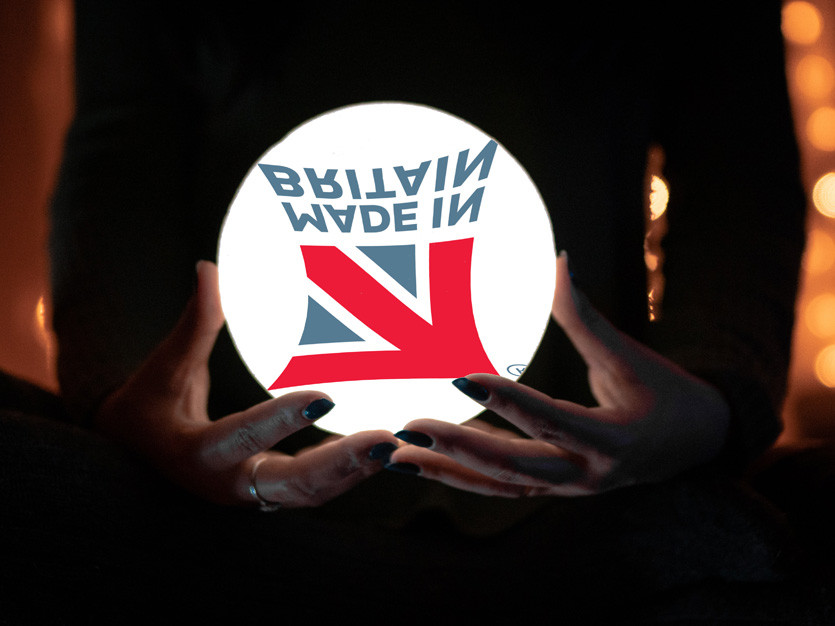Made in Britain CEO John Pearce marks the seventh anniversary of his joining the organisation with some predictions
.jpg) PREDICTING the next seven years of British manufacturing is easy – that is of course if you don’t mind living with the risks that your visions may not all come true, or worse still, you get the whole lot wrong.
PREDICTING the next seven years of British manufacturing is easy – that is of course if you don’t mind living with the risks that your visions may not all come true, or worse still, you get the whole lot wrong.
But before I look forward, I need to rewind - back to 8 April 2015 when I joined the organisation. The board of directors at the time made it very clear that the brand new, registered collective mark was designed to help protect the future of British manufacturing. The members’ businesses should all prosper through the collective visibility and the group should grow as the visibility demonstrates how attractive, interesting and varied the sector really is.
Fast-forward seven years and we all still agree on our key message - that British manufacturing businesses should be recognised and rewarded with a degree of prioritisation with public sector buyers, procurement professionals and consumers – not just because they are manufacturing a product in Britain, but because that product is of high quality and they run their business responsibly.
Made in Britain has always been a co-construction – we built the organisation based on what we learned from our members as they revealed their marketing needs and aspirations, and their visions for the future of British manufacturing. Based on what I have learned so far, here is what I predict for the next seven years of this sector.
Circularity and the circular economy will keep on moving further into the mainstream
That will mean more and more people recognise this transformation within economics from the linear business models to more low resource design thinking, upcycling of end-of-life products and materials, and zero-waste attitudes as a normal business practice, not the exception.
‘Needs’ will become as important to marketers as the ‘wants’
I’ve learned over time to separate out the marketing of needs to those of wants. For the economy to support the people it serves, there is a list of product types that everyone needs, like food, a home, energy and transport to name a few. And then there is the ‘wants’ or the desirables – not just a car to get you from A to B but one with features and benefits that may move the buyer from spending 10 per cent extra or more on something that’s more desirable – the want. Competitive manufacturing businesses will need to find ways to compete around fulfilling people’s needs better.
Transparency in business will become a standard business practice
The social media era has made protagonists of us all. Even businesses identify this, using celebrities as online influencers and employees as online ambassadors or ‘infomercial’ hosts. Once a business has shown the general public ‘backstage’ there is no going back. Members I’ve met over the years have always been keen to let the public in – some even going as far as organising days in for groups of school children.
Manufacturers will achieve a very special economic and social status
Using raw materials and energy, and employing people to design and test a product gives manufacturers longer lists of risks to manage and much greater responsibility for the natural world. Recognition of this challenge will, in my view, get greater every year.
Purpose will make way for impact
In marketing thought leadership, especially in the charity and non-profit sectors, purpose is important because bringing people together around a difficult or dangerous mission isn’t easy. Creating a belief system to support that effort demands that the leaders are able to articulate a vision clearly – the organisation of people around that clear purpose. But I’ve never had the feeling manufacturing sector businesses need a bolt-on purpose because all the people I’ve met in this sector know exactly why they go into work and what the end result is – a product. They know why they are at work.
But impact is different. The impact of what our business does is often not visible and not always positive. As economists struggle to agree on the measures of positive social impacts, so manufacturing businesses will have to acknowledge their impact challenges, like resource scarcity and shout loud about their many positive social and environmental impacts – such as employing people doing meaningful work in a safe and friendly environment at work, and using only 100 per cent up-cycled materials. Or, in some cases, accepting every product they ever made back to the factory for responsible up-cycling.
Getting to know the manufacturing community has made me even more of an optimist than I was before I started. I’m sure they will be able to adapt and cope, and that they will be able to earn more and more recognition for the long list of responsibilities to society, to the economy and to the natural world they manage every working day.
By Made in Britain 3 years ago | By Made in Britain
